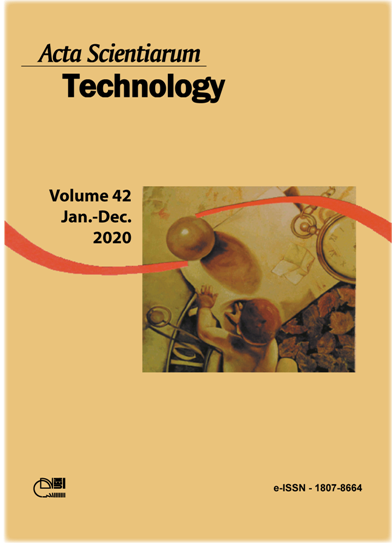Experimental research of capillary structure technologies for heat pipes
DOI:
https://doi.org/10.4025/actascitechnol.v42i1.48189Palavras-chave:
heat pipe; axial grooves; wire-EDM; sintered metal powder; experimental.Resumo
This paper presents an experimental study on three different capillary structure technologies of heat pipes for application in the thermal management of electronic packaging. The first capillary structure is that of axial grooves manufactured by wire electrical discharge machining (wire-EDM). The sintering process with copper powder produced the second heat pipe. Finally, a hybrid heat pipe was made by the combination of the two previous methods. The heat pipes were produced using copper tubes with an outer diameter of 9.45 mm and a length of 200 mm, and were tested horizontally at increasing heat loads varying from 5 to 35 W. The working fluid used was distilled water. The experimental results showed that all capillary structures for heat pipes worked successfully, so the studied manufacturing methods are suitable. Nonetheless, the hybrid heat pipe is the best, due to the lowest thermal resistance presented.
Downloads
Downloads
Publicado
Como Citar
Edição
Seção
Licença
DECLARAÇíO DE ORIGINALIDADE E DIREITOS AUTORAIS
Declaro que o presente artigo é original, não tendo sido submetido í publicação em qualquer outro periódico nacional ou internacional, quer seja em parte ou em sua totalidade.
Os direitos autorais pertencem exclusivamente aos autores. Os direitos de licenciamento utilizados pelo periódico é a licença Creative Commons Attribution 4.0 (CC BY 4.0): são permitidos o compartilhamento (cópia e distribuição do material em qualqer meio ou formato) e adaptação (remix, transformação e criação de material a partir do conteúdo assim licenciado para quaisquer fins, inclusive comerciais.
Recomenda-se a leitura desse link para maiores informações sobre o tema: fornecimento de créditos e referências de forma correta, entre outros detalhes cruciais para uso adequado do material licenciado.



















